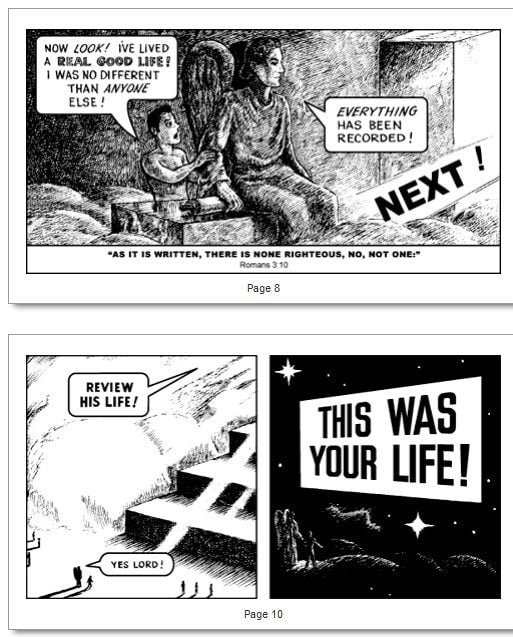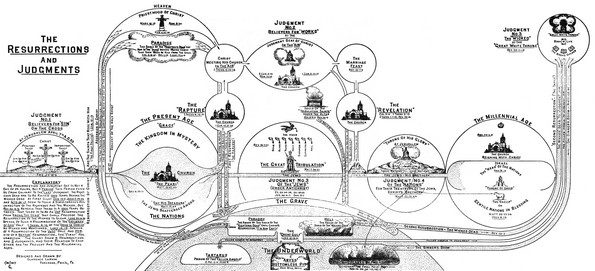
Note: I am quite familiar with the various eschatological schemes believed by Evangelical Christians. I speak generally in this article.
Most Evangelical Christians believe that their Lord and Savior, Jesus Christ, will one day return to Earth’s atmosphere (the clouds), and catch away (rapture) all the Christians. Unbelievers, including babies, children, and developmentally disabled people, will be left behind to suffer the wrath and judgment of the Almighty. For seven years, God will savagely and violently torture the inhabitants of earth, killing most of them. God will also ravage the planet, destroying most plant life and killing most animals. While God is busy maiming and slaughtering everyone, Christians will be gathered together in Heaven so they can judged and rewarded for their works by Jesus. This judgment is called the judgment seat of Christ (or BEMA seat).
Romans 14:10–12 says, “For we will all stand before God’s judgment seat. . . . So then, each of us will give an account of himself to God” (ESV). Second Corinthians 5:10 tells us, “We must all appear before the judgment seat of Christ, so that each of us may receive what is due us for the things done while in the body, whether good or bad.” In context, it is clear that both passages refer to Christians, not unbelievers. The judgment seat of Christ, therefore, involves believers giving an account of their lives to Christ.
The judgment seat of Christ does not determine salvation; that was determined by Christ’s sacrifice on our behalf (1 John 2:2) and our faith in Him (John 3:16). All of our sins are forgiven, and we will never be condemned for them (Romans 8:1). We should not look at the judgment seat of Christ as God judging our sins, but rather as God rewarding us for our lives. Yes, as the Bible says, we will have to give an account of ourselves. Part of this is surely answering for the sins we committed. However, that is not going to be the primary focus of the judgment seat of Christ.
At the judgment seat of Christ, believers are rewarded based on how faithfully they served Christ (1 Corinthians 9:4-27; 2 Timothy 2:5). Some of the things we might be judged on are how well we obeyed the Great Commission (Matthew 28:18-20), how victorious we were over sin (Romans 6:1-4), and how well we controlled our tongues (James 3:1-9). The Bible speaks of believers receiving crowns for different things based on how faithfully they served Christ (1 Corinthians 9:4-27; 2 Timothy 2:5). The various crowns are described in 2 Timothy 2:5, 2 Timothy 4:8, James 1:12, 1 Peter 5:4, and Revelation 2:10. James 1:12 is a good summary of how we should think about the judgment seat of Christ: “Blessed is the man who perseveres under trial, because when he has stood the test, he will receive the crown of life that God has promised to those who love him.”
After the Rapture, there will be a thousand-year period (the millennium) when Jesus will rule with a rod of iron. Satan and his demons will not be present on earth. He has been bound with chains and cast in the Lake of Fire. At the end of the millennium, Satan and his followers will be loosed for a time so he can deceive the masses (those who survived the Tribulation). Finally, Jesus has enough, comes to earth on a white horse with the hosts of Heaven (angels and Christians) to wage a final battle with Satan. After Satan is vanquished, all the unsaved people who have ever lived — billions and billions of people — will stand before God at the Great White Throne Judgment and be judged.
The great white throne judgment is described in Revelation 20:11-15 and is the final judgment prior to the lost being cast into the lake of fire. We know from Revelation 20:7-15 that this judgment will take place after the millennium and after Satan is thrown into the lake of fire where the beast and the false prophet are (Revelation 19:19-20; 20:7-10). The books that are opened (Revelation 20:12) contain records of everyone’s deeds, whether they are good or evil, because God knows everything that has ever been said, done, or even thought, and He will reward or punish each one accordingly (Psalm 28:4; 62:12; Romans 2:6; Revelation 2:23; 18:6; 22:12).
Also at this time, another book is opened, called the “book of life” (Revelation 20:12). It is this book that determines whether a person will inherit eternal life with God or receive everlasting punishment in the lake of fire. Although Christians are held accountable for their actions, they are forgiven in Christ and their names were written in the “book of life from the creation of the world” (Revelation 17:8). We also know from Scripture that it is at this judgment when the dead will be “judged according to what they had done” (Revelation 20:12) and that “anyone’s name” that is not “found written in the book of life” will be “thrown into the lake of fire” (Revelation 20:15).
I came of age in the Independent Fundamentalist Baptist (IFB) church movement in the 1960s and 1970s. Prophecy, especially the “imminent” return of Christ and the Tribulation, was a big deal. I attended an IFB college in the 1970s. While the return of Christ was part of the teaching and preaching mix, it was typically used as a motivator to encourage (demand) students to evangelize the lost.
While I knew there were at least two judgments, typically preachers comingled the Judgment Seat of Christ and the Great White Judgment, turning them into one final judgment where the dead small and great would stand before God and be judged, with the saved entering into the joy of the Lord and the unsaved being cast into the Lake of Fire, a place of fire, brimstone, wailing, and gnashing of teeth. Jack Chick polarized this view in his bestselling tract, This Was Your Life.
For all the talk about every human being facing judgment from God for their works, the only thing that will matter is whether a person was saved. Christians will be granted entrance into Heaven (eternal Kingdom of Heaven), not because of their works, but because they “believed” a certain set of propositional facts. Unbelievers will be thrown into the Lake of Fire, not because of their works, but because they didn’t “believe” a certain set of propositional facts.
Keep these things in mind when you see Evangelicals doing abominable things. Nothing they say and do in this life will keep them out of Heaven. Sure, God will smack their hands on Judgment Day and assign them a room without a view, but they will enjoy all the benefits of Heaven. On the other hand, the Lake of Fire will be populated with billions and billions of good people; people whose only “sin” was worshiping the wrong God or no god at all. Child molester preachers will end up singing with the angels in Heaven, whereas moral and ethical unbelievers will spend eternity being tortured by God. Why? They believed the wrong things.
Remember, according to 1 John 1:9, forgiveness for Christians is but a prayer away. No sin is so bad that God won’t forgive. Ponder that for a moment.
Please see This Is Your Life! Judgment Day, a guest post by ObstacleChick and Jack Chick: This Was Your Life by The N.I.B.
Bruce Gerencser, 68, lives in rural Northwest Ohio with his wife of 47 years. He and his wife have six grown children and sixteen grandchildren. Bruce pastored Evangelical churches for twenty-five years in Ohio, Texas, and Michigan. Bruce left the ministry in 2005, and in 2008 he left Christianity. Bruce is now a humanist and an atheist.
Your comments are welcome and appreciated. All first-time comments are moderated. Please read the commenting rules before commenting.
You can email Bruce via the Contact Form.

